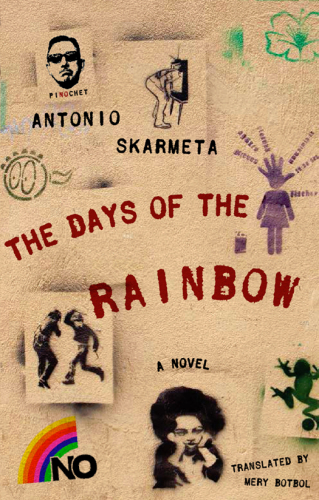
The Days of the Rainbow
A Novel
کتاب های مرتبط
- اطلاعات
- نقد و بررسی
- دیدگاه کاربران
نقد و بررسی

June 3, 2013
Set in the weeks leading up to the 1988 Chilean plebiscite that ended Pinchoet's rule, Skarmeta's historical novelâwinner of the 2011 Premio Iberoamericano Planeta-Casa de América de Narrativa awardâfollows two men as they navigate the difficult terrain of life under a dictatorship. Bettini, a brilliant, and thus underemployed, ad man is tasked with creating a 15-minute television ad campaign for the coalition of political parties who, seeking an end to Pinochet's rule, have united under the common cause of voting "No" on the plebiscite. As time runs out, Betinni strives to create a single message that can satisfy all the dissenters and inspire the Chilean people. Meanwhile, his daughter's boyfriend, Nico, attempts to find his father, a philosophy teacher who was arrested by Pinochet's men during class. As he awaits his father's return, Nico imagines the worst, slowly opening his eyes to the realities of Chile and adulthood. The dual narratives complement each other well, illustrating the horrors of Pinochet's regime and the difficulties of resistance. However, the emotional power and weight of Nico's narrative consistently overpowers Bettini's story, further unbalancing a translation that favors the informal, breezy language of the Chilean youth over the stolid speech of their elders.

October 1, 2013
The Chilean author (The Dancer and the Thief, 2008, etc.) uses two perspectives for this skimpy take on the twilight of the Pinochet dictatorship. In 1973, Gen. Pinochet seized power in Chile and began a reign of terror. Fifteen years later, the population is cowed and apathetic; there are still 3,000 missing detainees. Make that 3,001, for the novel begins with the arrest of professor Santos, philosophy teacher at Santiago's most prestigious high school. His son Nico and his classmates watch helplessly as he's taken from the classroom. Meanwhile, Adrian Bettini, father of Nico's girlfriend, Patricia, is summoned by Fernandez, the Interior minister. Bettini has reason to be fearful; he has been blacklisted, jailed and tortured. Today will be different. Pinochet has decided to hold an above-board referendum with a simple question: Do you want him to stay in office? A "no" vote will lead to a multiparty election. (All this is historically accurate.) Fernandez invites Bettini, once Chile's best ad man, to head the "yes" ad campaign. Bettini declines; he will work for the "no" campaign that's been granted 15 minutes on state-run television. Fifteen minutes against 15 years; it's a challenge, just as it's a challenge for Nico to find his father. Skarmeta flips between the two stories as he struggles to decide whether to emphasize the continuing horrors of Pinochet's rule or the glimmer of light of the "no" campaign. After Nico is shown the dead body of his beloved English teacher, a leftist, his throat cut, the author switches to the zany antics of the "no" campaign. Whether it's the catchy jingle or the rainbow logo, the "no" campaign prevails, the citizenry rejoices, and Santos is freed after strings are pulled. For Nico and Patricia, it's a triple: the end of virginity, of high school and of the dictatorship. A flawed attempt to illuminate an extraordinary historical moment; the fumbling translation is no help.
COPYRIGHT(2013) Kirkus Reviews, ALL RIGHTS RESERVED.

























دیدگاه کاربران